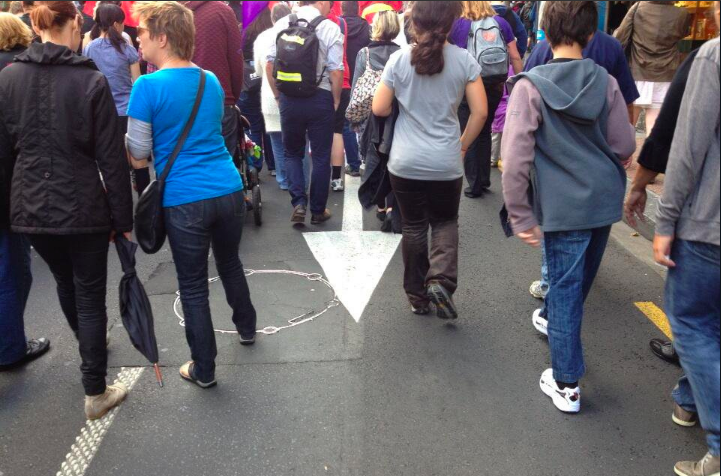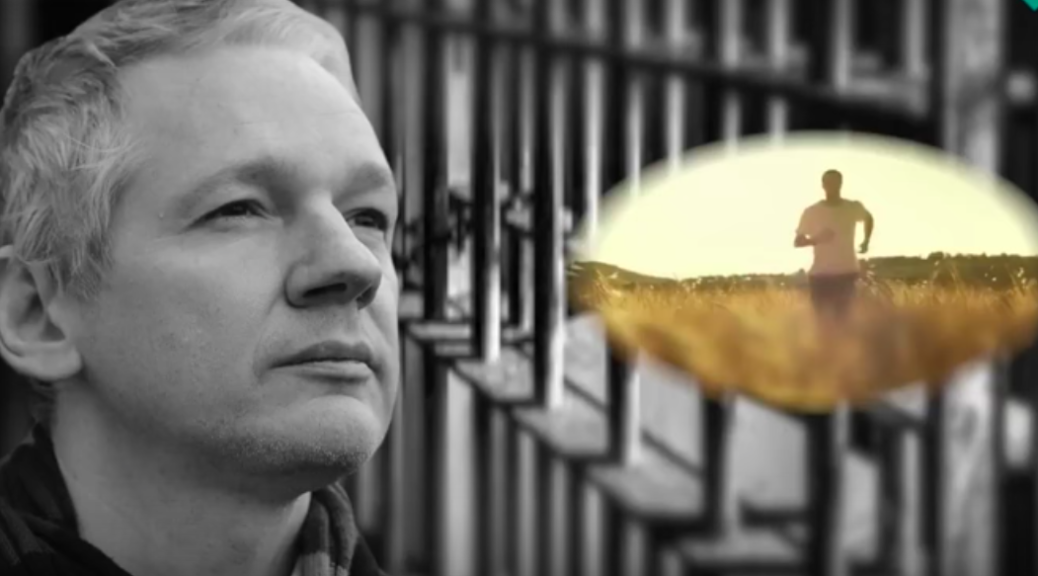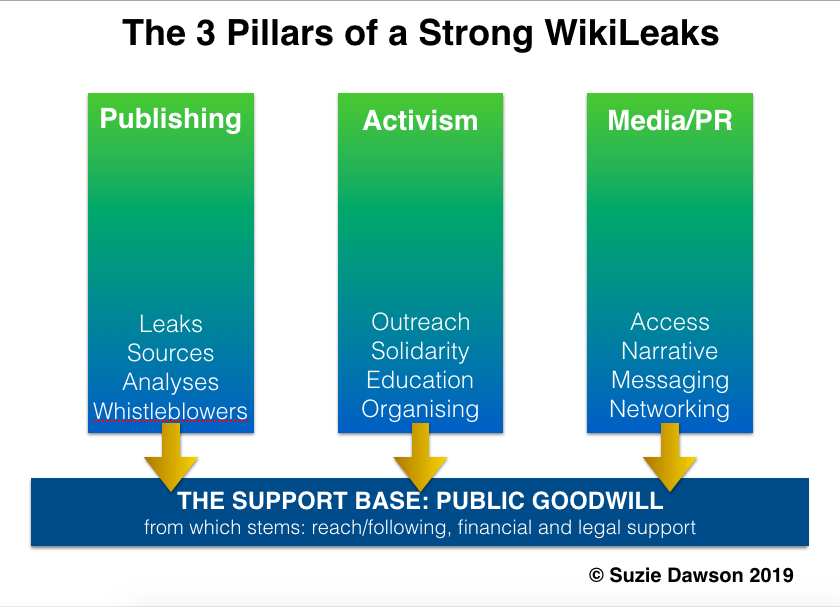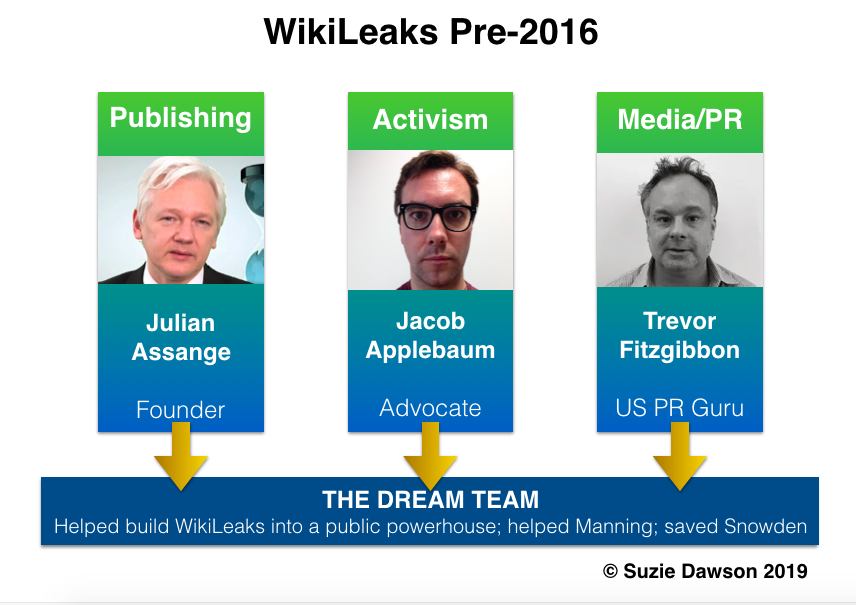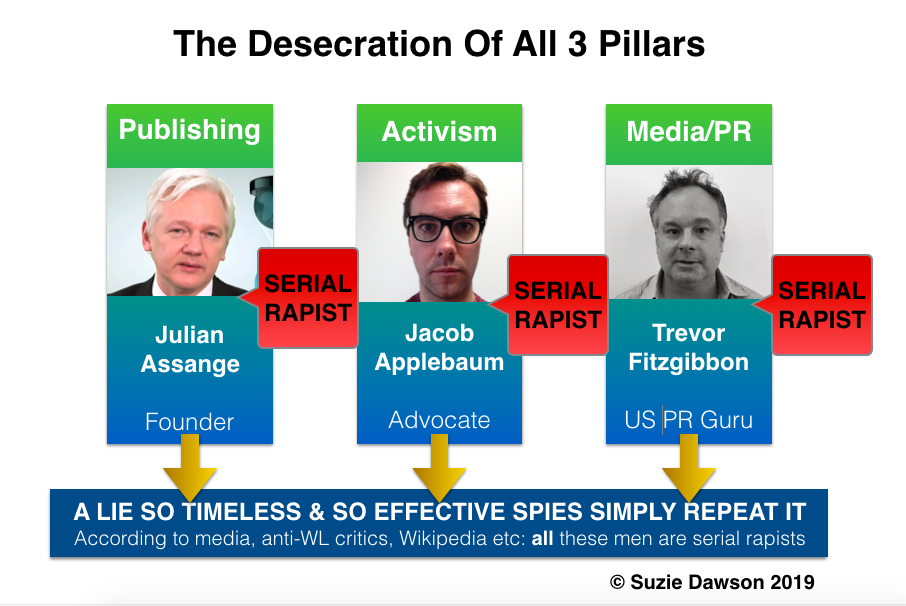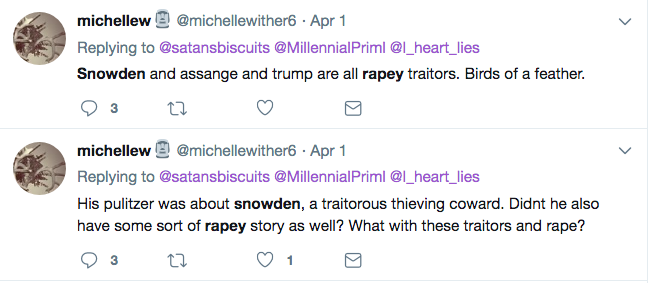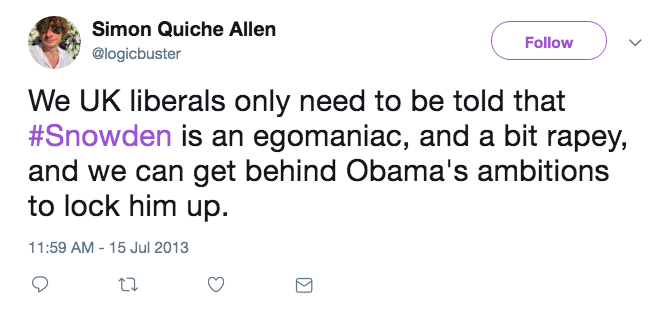I am a survivor of rape, gang rape and the abusive police process I was subjected to when I reported it and I am fed up with watching sexual violence being used as a cover for political attacks on Julian Assange, his colleagues and his supporters.
I am not alone. Numerous other survivors have reached out to me tonight expressing the same sentiment and we deserve to be heard.
Today, members of what is supposedly a women’s advocacy group published an open letter addressed to UN top brass, from the Secretary-General on down, complaining about an article written by UN Special Rapporteur on Torture Nils Melzer and attempting to call into question his suitability for his role.
Melzer has recently transformed the debate around 2019 Nobel Peace Prize Nominee Julian Assange’s situation by formally finding that Assange is a victim of state-sponsored (and publicly perpetuated) psychological torture.
The content of the open letter undermining Melzer is founded on a premise of advocating for and protecting the rights of women and of survivors of sexual violence. Yet when I self-identified as a survivor in tweets to the organisers of the open letter and dissented against their opinions, they belittled me and were dismissive of my arguments.
Yes, the very women who should have been most sincere about unpacking the experiences and feelings of a survivor of sexual assault could not muster a single shred of empathy for me, nor did they express even the mildest concern for my wellbeing or safety, despite my clearly having been triggered by the conversation.
The very women who complained in their open letter against Melzer, of “insensitivity to victims of sexual assault” and “..a profound lack of understanding…” were themselves apparently incapable of demonstrating any sensitivity or understanding when dealing directly with a survivor.
And it is thus, the issue. Too often the theory that is advanced that “we must support victims!” and “we must centre the voices of women and survivors!” doesn’t match the practice. Despite being self-styled advocates, academics and lawyers, they were simply too wrapped up in themselves to have the time of day for a lowly survivor of sexual assault who was outside of their clique. They weren’t considerate of my right to my own opinions and weren’t prepared to consider them.
I can’t help but notice that their attitudes stand in stark contrast to that of Melzer himself. Standing in the harsh light of their accusations, he handled himself with poise, grace and more – with willingness to engage, receptiveness to their arguments, and with a concerted focus on bettering outcomes for survivors.
The reactions of those same women to my (and others) inquiries couldn’t have been any different from Melzer’s reaction. Instead of welcoming our input or engaging in constructive dialogue, they defaulted to posturing themselves as the victims, proclaiming on social media that they were being attacked. While continually boasting of having added further signatories to their attempt to undermine Melzer’s career.
Sadly, Melzer is not a lone target of the tactic of organised mass signings of an open letter being employed against him. WikiLeaks PR Consultant Trevor Fitzgibbon was the subject of an open letter signed by 72 progressive organisations decrying him as a serial abuser of women. Their lobbying efforts against him brought down his successful business and destroyed his career and his marriage, prior to him being cleared of all charges after lengthy investigations by authorities. Fitzgibbon subsequently won a defamation case against his primary accuser, after revelations of her private text message communications with him (available on the court record) made it clear that he had never raped her. His accuser has now retracted her accusations.
Likewise the activism career of WikiLeaks advocate Jacob Appelbaum was destroyed by similar tactics. Open letters were used to de-platform him at major tech conferences and hackerspaces, including one he co-founded. The public shaming campaign against him eventually boiled down to a sole complainant of sexual assault – by a person who has since gone on to make extremely dubious allegations against two other high profile members of the tech industry and is likewise now facing defamation proceedings as a result.
As a survivor of rape, it is gutting to have to continually watch people who profess to act in defence of women attack and destroy good men in the name of protecting survivors. I can not simply sit by and allow rape to continue to be weaponised for political gain.
Therefore I am writing my own open letter in response to that penned by Melzer’s critics, both in direct response to the substance (or lack thereof) of their claims, and to draw a line. A line that says, if you take this man down, it will not be in our name.
If academics read this response and are principled and brave enough to co-sign it, that is great. However I am most interested in platforming and amplifying the voices of regular people, many of whom will also inevitably be fellow survivors, who too often are the forgotten or silent majority, while the circus of these tar-and-feather public shaming campaigns continues unabated.
It is only by speaking out that we can stop them. And it is way past time.
Not In My Name: Open letter in response to the open letter by purported women’s advocates attacking the credibility of UN Special Rapporteur for Torture Nils Melzer
To: Ms Michelle Bachelet Jeria, United Nations High Commissioner for Human Rights; Ms Kate Gilmore, UN Deputy High Commissioner for Human Rights; Coordination Committee of UN Special Procedures (chair Ms Anita Ramasastry, Mr Victor Madrigal-Borloz, Mr Javaid Rehman, Ms Leigh Toomey, Mr Clément Voulé and Mr Dainius Puras)
On 1st July 2019 an open letter was penned to your excellencies that has so far been co-signed by 150+ people who identify themselves as “practitioners and scholars in international law and human rights”.
The authors of the article assert:
- They “are deeply disturbed by the way [Melzer] approaches the allegations of sexual assault in this case.”
- that Melzer’s “tone is unbecoming of a UN mandate holder“
- that Melzer “dismisses the allegations on the basis that they do not “have the ring of rape in any language other than Swedish”. Mr Melzer’s statement is incorrect.”
- that Melzer “grossly misunderstands the realities and legalities of sexual assault when he dismisses the allegations against Mr Assange on the basis that they “do not involve any violence”.“
- that “Allegations against powerful or high-profile men such as Julian Assange are routinely dismissed as attention-seeking or part of a conspiracy to bring them down. Mr Melzer’s “op ed” perpetuates this dangerous narrative“
They concede:
- that Melzer’s “overarching argument may merit attention“
- that in their arguments, they will be “leaving aside whether this is an accurate summary of the events of the case”
- that “Mr Assange has fundamental rights to freedom from torture, a presumption of innocence, and a fair trial.“
The crux of the assertions of the authors of the open letter hinge upon a portion of an interview Melzer gave to Pulitzer Prize-winning journalist Chris Hedges on his show On Contact. They quote Melzer as having said:
“I think it is also important to point out what is called a “rape” allegation is not by any stretch what would be called “rape” in English or any other language other than Swedish, and I know what I’m talking about because I do speak Swedish. What this “rape” allegation refers to is an offence that doesn’t involve any violence (…) [Assange] is being accused of having ripped a condom during consensual intercourse (…) this is something no one will ever be able to prove.”
But here is what Melzer actually said word for word:
“I think it is important also to point out that what is called a rape allegation is not by any stretch what would be called rape in English or any other language than Swedish in the world and I know what I’m talking about because I do speak Swedish. So, what this rape allegation refers to, an offence, that doesn’t involve any violence.”
In the interview, Melzer stresses the words “an offence”. This can be heard precisely at 10:57 in the interview. It is the offence itself, stipulated in the Swedish law books, that was specifically designed for when violence was not used in the course of the action.
The English translation of the law is insufficient to explain the precise wording of the definition of the charge. The original Swedish law text makes implicitly clear that it applies only to instances of lessened violence than a forced penetration. That is why it is usually reported in English-language media as “lesser rape”. In the Swedish language, the implied lessening of the level of violence is even more pronounced. Which is why Melzer was explaining that he is fluent in Swedish. Because of that, he was able to interpret the full meaning of the wording of the laws, and therefore the nature of the allegations, in a way in which English speakers cannot.
Therefore the accusation that Melzer was trying to depict rape as a non-violent act is completely false. This invalidates the core premise of the original Open Letter of complaint against Melzer.
Melzer was simply describing an offence as it existed in 2010 on the Swedish law books. That law has since been changed in 2018. The 2018 interpretation appears to be closer to what the authors of the Open Letter wish to ascribe; however it simply was not relevant to Melzer’s credible and learned assessment of the original 2010 offence invoked against Assange.
The signatories to the Open Letter are signing it on the understanding that it contains an accurate depiction of Melzer’s actions. However, as evidenced above, the letter does not. Therefore it is a fundamentally flawed document, a misuse of the network being employed to amass signatures, a potential risk to the academic reputations of the signatories and a disservice to those on whose behalf it seeks to advocate.
Although the above sufficiently nullifies the allegations of professional impropriety falsely levelled at Melzer there is another issue which I wish to briefly cover off.
The open letter seeks to posture itself as being unbiased and objective, as well as to distance itself from any potential debate about the specifics of Assange’s case. Despite the fact that Melzer’s cited commentary was entirely specific to Assange’s case.
Unfortunately, even the most rudimentary research has unearthed that the primary organisers of the open letter have, in public, been far from unbiased towards Assange.
Out of respect, I will not name names at this point, as the purpose of this letter is not to engage in public shaming, however I am in possession of screenshots of multiple past statements published by the top proponents, organisers and signatories of the open letter making false, defamatory and biased statements about Julian Assange from their professional social media profiles and platforms.
Those statements echo some of the precise wording exhibited by state actors who have ultimately been responsible for the psychological torture of Assange that Melzer exposed.
Likewise, there is evidence of direct ties between the authors of the letter and some of the most voracious and defamatory critics of Assange that exist in the mainstream media sphere. The biases are deep and the relationships clear for all to see, with a few simple keyword searches.
It needs to be recognised and understood, that when Melzer exposed the public “mobbing” and psychological torture of Assange, that many professional human rights and legal advocates who had failed to act on Assange’s behalf or in solidarity with his plight across a number of years, themselves became tacitly implicated in his persecution. Whether it be because they had fallen victim to malicious mainstream reporting about his case, or whether it was due to their own ties to the states that have been and are actively persecuting him, they have been shown in action to have not lived up to their professed principles. That hypocrisy is publicly embarrassing. There are many professionals who would project themselves as being against torture, who have one way or another in this case, become complicit in it. Whether deliberately, or by their silence.
The correct action would be of course for them to acknowledge their error, atone for it and pick up the baton that Melzer has bravely carried thus far. Not to attack Melzer, undermine him, shame him, use social media to “mob” him as Assange was subjected to for so many years, or seek to distract from the severity of the implications of Melzer’s findings.
It was bad enough that a publisher went most of a decade being tortured in the heart of a major Western capital city with so few in the professional class daring to speak against it. Let us not see those same tactics now be allowed to be wielded against a UN Special Rapporteur too. We cannot allow those who, be it purposefully or inadvertently, contributed to the torture of a publisher, become the public prosecutors of the Special Rapporteur who exposed the torture.
What Melzer has done, in thoroughly researching in minute detail the case of Julian Assange, is historic and lends great credence and weight to the reputation of the United Nations as a whole. I know of many who had frankly lost faith in the organisation, only to have it restored by Melzer’s courage, tenacity and attention to detail. His is a significant achievement, undertaken in good conscience and in the face of overwhelmingly powerful and hostile forces, and for that he should be rewarded and not punished.
My 2018, 24,000-word research tome about the Assange case, called ‘Being Julian Assange‘ was read by over 140,000 people on this website alone, not including the multiple other locations and countries in which it was republished. In that piece, which was tweeted by Julian Assange shortly before he was silenced, as well as by WikiLeaks, Christine Assange and countless others, I wrote an important piece of testimony, about what it feels like as a survivor to watch the allegations against Julian Assange bandied about as “rape” all these years. I feel compelled to quote it in full:
“The apparent inability of self-styled defenders of women to differentiate between the physical and deliberate violence of actual rape, such as Bill Clinton’s rape of Juanita Broderick, compared to disagreements over condoms or in the case of Appelbaum, non-consensual back-washing, kissing someone in a bar, propositioning someone or making bad jokes, undermines and is frankly depressing to, those of us who are survivors.
Sexually harmful behaviours and other aspects of rape culture can and should be denounced and deplored, without having to equate it to rape. The proclivity of the liberal set for doing so waters down and diminishes the experience of rape victims, and the seriousness of it. It seems to be yet another function of privilege, to bandy about terms such as “rape”, “rapist”, and “serial rapist” without understanding the repercussions of doing so.
Rape is an assault on all five senses. For a protracted period of time thereafter, it renders you almost unable to live inside your body, to live inside your life. Unable to preserve your sensory perceptions or restore them to how they functioned before the rape.
To falsely describe sexually problematic behaviour common amongst the entire population as “rape” belittles and undermines survivors, as does unfairly expanding the definition of what constitutes a rapist, or branding every man a rapist by affiliation. Doing so causes many men who are not rapists to recoil from confronting what does need to change. It dissuades them from meaningfully engaging on legitimate issues. It encourages an inevitable and counterproductive backlash, that needn’t have occurred.”
This reflects a broad societal trend to blur the lines of what rape is, to expand its definition by using terms like “rapey“, a term often invoked in relation to Assange. I addressed the use of that term also.
“The term “rapey” is itself, offensive. With its use, the definition of rape is being willfully expanded into borderline meaninglessness and obscurity. As if there can be “racisty” or “sexisty” or “homophobicy”. There cannot. Rape is an absolute, and a serious crime against humanity. The term should not be callously invoked; watered down for the social convenience of he or she exercising the privilege inherently wielded when bastardising the language of the violated.”
Given that the eyes of many who believe themselves to be defenders of women are likely to read this letter, I felt it important to highlight those passages. Because foremost in the minds of those who advocate for survivors must be a concerted effort to understand how we feel, our wish to preserve the words which describe our experiences, and to retain ownership of them much as any marginalised or vulnerable group does with language used to describe them. Rape is a word that should be used with respect for the price those of us who have experienced it paid. It should never be callously bandied about, its definition should never be allowed to become meaningless, and the accusation of it should never, ever be used as a political weapon.
It is possible that in his research, Melzer read the above quoted passages and was affected by them. If so, I am grateful, and if not, I know that others were and will be.
But if Melzer is to now have rotten fruit thrown at him in the town square for breaking taboos to defend a victim of torture who others did not, then it will not be in my name.
Authored by: Suzie Dawson
Co-Signed By:
SURVIVORS OF SEXUAL ASSAULT WHO CLAIM THEIR RIGHT TO BE RECOGNISED AS SUCH AND HAVE THEIR VOICES HEARD:
-
-
-
-
-
- Suzie Dawson, Journalist and activist
- Ariyana Love, Journalist and Human Rights defender
- Beth Wendy Grundfest-Frigeri, Disabled activist
- Grayden Shelley, Artist
- Kitty Hundal, Retired, Ontario Civil Liberties Association, Author
- Rachel Collins, Housewife
- Lilain Duffy, Sociologist
- Caitlin Johnstone, Journalist, Poet
- Sarah Freeis, Activist, Artist
- Sandra Hewett, Unemployed
- Halo Benson, Mom
- Reverend Elisa Standridge Howell, Minister and Spiritual Advisor
- Sarah Jane Brennan, Independent Journalist, Human Rights Activist
- Sarah Taylor, Researcher
- Caressia Blair, Unemployed
- Pema Than, Parent, Scientist
- Christine Dopf, M.Sc, Activist
- Helena Jennie, College Professor
- Raine James, Forklift Operator, Mother
- Joanne Maree Le Mura, BA – Community Services, Community Development, Human Rights Advocate
- Sharon K. Raum, Retired
- Louise Bennet, Media Advisor
- Nicki Myers, Musician
- Carrie Ellsworth, Student
- Meaghan Walker, Researcher, Writer
- Teresa Marshall, Massage Therapist
- Diane Friedman, Retired Health Professional, Peace Activist, Mother, Grandmother
- Hope Kesselring, Writer
- Dr. Christine DeCarlo, Disabled Activist
- Taurean Benson, Husband and Father
- Annabelle Hodge, Mother
- Courtney Imholt, Homemaker
- Danielle J. Dunkley, Student
- Carmen Powers, Grandmother, Activist
- Doug, Retired Musician and Teacher
- Lily Torres, Engineer, Mother
- Tam Brewer, Retired, Activist
- Jayne Jackie Brown, Mother, Peace and Human Rights Activist
- Carol Watt, Chinese Medicine Practitioner
- Nadia N. Kira, Painter, Art Therapist
- Bella Magnani, Researcher
- Lorese Vera MA., Teacher, Writer, Editor
- Joanne Doran, Lecturer of Health Sciences
- I. E., Writer
- Vivian Kubrick, Composer, Filmmaker
- Irene Potashner, Project Coordinator
- Kat Irvine, Self-employed
- Alice Bergot, Artist
- Cleonarda da Venezia, Carer, Artist
- Kim McMahon, Student
- Patricia Call, Human Rights Activist
- V. V. R., Disabled Activist
- Eloïse Vanhouteghem, Illustrator
- Jill P. Michaels, Retired
- Siobhan Cawson Mooney, Musician, Activist
- Leslie Stein, Retired
- Kyra Moore, M. Ed., Teacher
- Wiesje Slot, Activist
- Jude Fleming, Human Rights Defender, Writer
- Sandra Hill, Researcher/Analyst, Mother, Student
- Madeleine Love, Independent Scholar, Senate Candidate (AUS)
- Ally Cordingly, Educationalist
- Animae Jones, Retired, Activist
- Marti Babb, Small Business Owner
- Stephanie Marsilia, College Lecturer, Licensed Psychotherapist
- Leanne Ramirez, Retired US Military
- Shari Nolder, Activist, Artist, Caregiver
- Eul Liester, Sales Worker
- Melinda McCracken, Retired
- Graham Elwood, Political Comedian, Filmmaker
- Ann Garrison, Journalist
- Dr. Marni Sheppeard, Unemployed Theoretical Physicist
- Julie Meyer, College Access Professional
- Lauren Ellis, Case Worker, Artist
- Cynthia George, Advocate for the Elderly
- Rosie Ingram, Mother, Grandmother
- Kristin Bright, Truck Driver, Humanitarian
- Quinn Petersen, Activist
- Deborah Hendry, Educator, Counsellor, PhD Candidate
- Hali Cespedes-Chorin, Technical Writer
- Susan Neece, Art Therapist
- E. Schemer, Artist
- Lorraine Tipton, Co-founder, American Mothers Party
- Esther Hendriksen, former International Policy Advisor
- Martin K. O’Connor, Unemployed
- Rosita Allinckx, Activist, Artist
- Ken Black, Entrepreneur
- Mairi Nicola Morrison, Legal Scholar
- Nel Lane, Activist, Writer, Social Justice Advocate
- Kylie McCrimmon, Intensive Care Nurse, Mother
- Elpo Damianou, ex-UNHCR Congo
- Kristine Rael, Piano Teacher
- Yvonne Holzmayer, Teacher, Mother
- Hamed Pakatchi, Graduate Student
- Elise Tak, Artist
- Kit Jones, Licensed Psychotherapist/Mental Health Counsellor
- M. Mayermiar, Veteran
- Johanna Harman, Supporter
- Lauren B. Wilson, Disabled Activist, Artist
- Pamela Anderson, Activist
- Deepa Govindarajan Driver, Lecturer, Trade Unionist, Mother
- Adele Margaret Goldie, Artist, Peace Activist, Worker
- David Denton, Government Worker
- Carol Hale, Retired Federal Public Defender, Investigator
- Dr. Lilliana Corridor, Marine Biologist, Oceanographer, Human Rights Defender
- Charmaine Jones, Chef, Grandmother, Activist
- Barbara Kim Thigpen, Grandmother, Consumer advocate, Teacher, Activist
- Tamara Otello, Retired Social Worker
- Ania Nowakowska, Graphic Designer
- Ginger Beeler, Operating Room Sterilizer
- Kara Seboldt, Data Analyst
- Marirose Walker, Disabled Activist
- Magda Hassan, Psychotherapist, Educator
- JoAnn Maschè-Daane, Activist, Artist
- Dr Carol Mackenzie, Urban Social Scientist
- Susan Chandler, Disabled Activist
- Arturo Íñiguez Yuste, Principal Administrator, European Economic and Social Committee
- Rasili O’Connor, Musician, Copyeditor
- Steve Jimenez, Journalist
- Damian Nicell, Mental Health Advocate
OTHER CARING HUMAN BEINGS STANDING IN SOLIDARITY WITH NILS MELZER:
- Louise Bracken, Retail Cashier
- Niki Konstantinidis, Barrister and Solicitor
- Lohan Gunaweera, Visual & Performance Artist, Translator
- Dr. Thomas Harvey, Honorary Research Associate in Philosophy, University of Auckland
- Clinton David Hohneck, Engineer
- Laura Genovese, School Secretary
- Marijke Hultzer, Retired journalist
- Taylor Hudak, Journalist and activist
- Rasmus Sylvester Forsberg Outzen, Intelligence activist
- Paula Iasella, Broadway Costume Design/Wardrobe
- Paul Neville, Retired
- Laura Killian, Unemployed Academic (Science and Engineering), Pirate Party Australia
- John Anthony Giles, Retired
- William Hogan, Professor
- Linda Hagge, Retired University Instructor
- Nicholas Woodward, Painter
- Stacy O’Neill, Teacher
- Mary-Ann Jones, PhD, Retired Scientist
- Julie Milicevic, Educator
- Vivek Nayak, Data Entry Office Worker
- Cassandra Fairbanks, Journalist
- Patricia Perlo, IT Business Analyst
- Jessie A. Kim, Small Business Owner
- Roger Close, Unemployed, Former DJ, Student
- Tyler McMillan, Consultant
- Lorilee House, Retired Editor
- Bruce Turnbull, Pensioner
- Deborah Thomas, Hand Therapist
- Flavia Westerwelle, Self-emplyed Artist
- Kendra Christian, Sales Manager
- Michele Cochrane, Retired University Administrator
- Clare Smith, Self-employed
- Mary Naylor, Retired Teacher, Poet
- Jason Brinkman, Retired
- Marie Apap, Teacher
- Laura Eckert, Artist
- Joslyn Erica, Social Worker, Herbalist, Mother
- Michelle Wood, Activist, Mother, Naturopath
- Concerned Citizen, Portland Activist
- Alex Hills, Activist
- Marty Cook, Teacher
- Chris Lonsdale, Psychologist, Linguist, Educator, Entrepreneur
- Lorraine Harvey, Retired
- Gordon Dimmack, Independent Journalist
- Ann Batiza, PhD., Retired Academic
- Chris Leising, Photographer
- Daniel Wirt, Medical Doctor
- Fabel Arostegi, Teacher
- Celia Moore, Carer, Swimming Teacher, Activist
- Dave Donnellan, Peace Activist
- Dragos Savu, Accountant
- Lynne Bon de Veire, Artist
- Stephen Boni, Essayist, Editor, Storyteller
- Ian Colville, Product Manager
- Nic, Retired Mental Health Worker
- Lorese Vera, MA, Teacher, Writer
- Anna Moras, Executive Assistant
- Shaista Salam, Peace Activist
- Lucinda Manning, Activist, Archivist, Feminist, Librarian
- Noah Baslaw, Student
- Kristin Scott, Therapist
- Humberto Arturo Reaza Jr., Teacher
- Odette Louise Stevens, Artist
- Monique Jolie, Unemployed
- Rob Trimmer, Security Guard
- Nina Cross, Teacher, Writer
- Mehdi Taileb, Activist
- Shona Davidson, Retired
- Tatiana Schild, Mother, Activist
- George Szamuely PhD., Author
- Charlotte Gracias, Project Manager
- Elizabeth Hamilton, Grandmother, Disabled Activist
- Somerset Bean, Graphic Designer
- Julie Collier, Homemaker
- Bradley C. Hughes, former Greens Counsellor and Deputy Mayor, Randwick, NSW
- Judy Driggers, Mother, Grandmother
- Pierre Studler, Plumber
- John Hayward, Pensioner
- Stephen Perrett, Small Business Owner
- Christian Larsson, Student
- Jose Rivera, Builder
- Belinda Curtis, Support Worker, Accomodation Manager
- Spring Grace Eselgroth, Copy Editor, Activist
- Theodore W. Altmeter, Retired
- Elizabeth Mueller, Activist, Researcher
- Jenni Hall, Investigative Research and Screenplay Writer
- Paula Murphy, Supporter
- Jean B. Palmer, Supporter
- Serena Ferrario, Unemployed
- Francois Guesdon, Unemployed
- Jennifer Lyon, Clinical Librarian
- Sasha Mitrovich, Retired
- Annika Dahlbäck, Acupuncturist
- Lissa K. Johnson, Clinical Psychologist
- Elizabeth Hawke, Retired
- Jean Chevrier, Self-employed
- Mike Hurt, Web Developer
- Göran Stål, Osteopath
- Roseanne Martorana, Physical Therapy Driver, Dog Walker
- Tristan Roch-Desparois, Hardware Store Worker
- Anna Palczynska, Nurse
- Brad Lacke, Freelance Artist
- Satu Hiitola, Supporter
- W. Hall, Supporter
- Christa Oberwalder, Activist
- Freyja Inanna, Nurse, Midwife
- Michael Inanna, Engineer, Healing Retreat Manager
- Eleanor Boyd, Retired Teacher
- Claire Lowe, Complimentary Therapist
- Jane George, Author, Illustrator
- Lyndsey Young, Receptionist
- Wilson Mpalweni, Journalist
- Juan Rebes, IT Consultant
- Dennis Revell, Property Management, Technical Research
- Karina Fernandes, Self-employed
- Andreas Schwarzmeier, Engineer
- Karen Sprowl, Rehabilitation Counsellor, Nurse
- Davena Turvey, Retired Actor
- Barry J. Fleming, Consulting Director, Technologist, Activist
- Tricia Rajabipour, CT Tech
- Nozomi Hayase, PhD, Author
- Danielle Wood, Artist, Activist
- Donna Piranha, Anthropologist, Activist
- Elvira Ferreira, Activist
- J. Bogoeva, Supporter
- Miguel de Sousa Pires, IT Worker
- James Miller, Carpenter
- Irene Heitsch, Housewife
- Sherry Clayton, Musician
- Jeanie Schmidt, Nurse, Mother
- Pete DeLorenzo, Musician, Restaurant Worker
- Vanessa Byrne, Mother, Homemaker
- Chris Whitside, Writer, Producer
- Donna Moon, Home Healthcare Provider
- Tom Pappalardo, Uber Driver
- Jon Krampner, Activist, Author
- Colin Goodayle, Retired Public Servant
- John McEvoy, Journalist
- Calvin Benson, Whistleblower Advocate
- Cory Twinney, Pharmacist
- Yvonne Langlois, Retired Administrator
- Frank Hopewell, Network Rail
- Desiree Assaad, HR Specialist
- David Sutton, Unemployed Engineer
- Isabel Oliveira, Supporter
- Jenny Trigg, Retired Health Worker
- Magnus Mickelsson, Software Developer
- Kimera Muwanguzi Anthony, Photographer, Farmer, Small Business Owner
- Shannon Shipley, Lead Organizer for Immigrant and Refugee Rights
- Arianna Marchionne, Scientist
- Bjørnar Simonsen, Sociology Student
- Mary Kostakidis, Journalist
- Carl Clarke, Human Resources Manager
- Michael Fitzgerald, Commercial Real Estate Broker
- Fionnuala Hendrick, CEO
- Liesbeth Nieuwenweg, Webmaster
- Anne Ridgley, Translator
- Tresilla Wood, Homemaker
- Lauren Richardson, Investor
- Maria Mollenkopf, Disabled
- Greg L. Bean, Information Systems Architect
- Kate Hecimovic, Higher Education Administrator
- Patrick Coss, Unemployed
- Tom Heron, Recording Engineer, Teacher
- Sandra Lewis, Child Carer
- Raphael Steele, Engineer
- John Mayall, Software Professional
- Lorine Brice, Supporter
- Andrew Mcguinness, Lecturer
- David Macilwain, Independent Writer, Activist
- Dane Owen, Supporter
- Jim Kavanagh, Former Professor, Political Analyst
- Elissar Hanna, Student
- Bjørn Danielsen, Systems Architect
- Maarten Vos, Student
- Tuan Tran, History Teacher
- Linda Hanakova, Healthcare Worker
- Paul J. Zickler, High School Teacher
- Tony Ansell, Sales Worker
- André Forsberg, Medical Student
- Mary Henning, Filmmaker
- Kathleen Cain, Supporter
- Sylvia Bennet, Retired Theatre Professional
- Zeina Farah, Political Scientist
- Sue Worp, Speech Language Pathologist
- Kent Kingsley, Self-Employed
- Roy David, Writer
- Carol Barnes, Former Domestic Abuse Coordinator/Advisor
- Alex Tiedemann, Supporter
- Jacqui Ham, Musician
- Emily E. Hamilton, Cook
- Lianne Rowe, Artist, Psychologist
- Alex Mazey, Poet, Essayist
- Vincent Abinet, Self-Employed, Teacher
- Tamara Thomas, Property Manager
- Juliet Smith, Teacher, Mother
- Brett Smith, Naturopath
- Pete Hallpike, English Teacher
- Mara Modesto-Wrobel, Retired
- Peter Thomas, Team Manager
- Teresa Bear, Certified Public Accountant
- Mehrzad Mahmoudian-Geller, College Professor
- Mark Brooks, Writer, Retired Business Person
- Jodi Thomas, Housewife, Former Senior Physiotherapy Assistant
- Colleen Whittemore, Retired
- Brian Robinson, Retired
- Gary M. Lord, Activist
- Paul Mansfield, Civil Servant
- Dr Lawrence Taylor, Activist, Retired Chiropractor
- Fiona Hansen, Supporter
- Lisa Cardon, Retired Nurse
- Rob Skinner, Supporter
- Mara Kupka, Screenwriter, Performer
- Fletcher Lenz, Auditor
- Manfred Pürro, Software Architect
- Cathy Raats, Supporter
- Victoria Husemeyer, Fund Manager
- Claus Bang, Mathematician
- Amin Talha, B Arch, PMP
- Christine Assange, Mother of persecuted journalist Julian Assange
- Susan Inman, Retired
- Karen Lawson, Supporter
- Elmarie van der Merwe, Activist
- Valentina Flex, Archivist
- Olga Christensen, Graduate
- Hans Jørgen Kjærnet, Supporter
- Kelly Kolisnik, Web Developer
- Jack Yan, Publisher
- Stephanie Wilson, Supporter
- Sonia Soares, Supporter
- Omer ElSouri, Journalist
- Gadi Nisenholz, Programmer
- Deborah Meyer, Retired, Artist
- Uschi Schueller, Artist, Human Rights Activist
- Michael Joyce, Supporter
- Anna L. E. Price, Administrator
- Manuela Alava, Lab Technician, Student
- Alan L. Stewart, Author, Activist
- Chris Whittington. Retired Programmer, Publisher
- Cheryl Browne, Supporter
- Charlene Parsons, Entrepreneur
- Anne Hinde, Supporter
- Nabil H., Disabled Activist
- Sue Stathoris, Supporter
- Dan Smith, Analyst
- Brenda Bonnici, PhD., Pharmacist
- I. Zvonko, Supporter
- Michael Zakko, Student
- Spyros Marchetos, Historian, School of Political Sciences, Aristotle University of Thessaloniki
- Sergio Mauro, Engineer
- Alison Hunter, IT Systems Analyst
- James Fields, Supporter
- Tania Yegdich, Retired Mental Health Educator
- Judith Tanner, Supporter
- Caspar Nørgaard, Photographer
- Bernie Cunningham, Supporter
- Cristina Mérchante, Supporter
- Katrina Watson, Researcher
- Currie Dobson, Supporter
- Kimber Maddox, Graphic Designer
- F. P. Turner, Self-Employed
- John Read, Interpreter
- Yukari Miyamae, Translator
- Mercy Wolf. Activist, Mother, Marriage Celebrant
- Jie Wang, Customer Service
- Abby Brickler, Supporter
- Jeff Bunsell, Software Developer
- Jerome Davis, Accountant
- John Thomson, Real Estate
- Jim Moore, Engineer
- Gera Shumaker, Supporter
- Daryl Snow, Retired Firefighter (FRNSW)
- Rodney Lomax, Disability Pensioner
- Nick Bruechle, Writer
- Ian Caruana, Engineer
- Shaun Davis, Geologist
- Raul Ilargi, Writer
- Kathy Fannin, Retired Informatics Manager
- Dominique Lorec, Translator
- Ronnie Mitchell, Supporter
- Alain Schenkel, teacher
- Karyn Hemming, Mortgage Broker
- Christiane Reuthner, Industrial Engineer, Student
- Thushara Wijeratna, Software Engineer
- Matthew Prockter, Investment Adviser
- Oana Halla, Housewife, former IT Systems Administrator
- Julian Tol, Tech Entrepreneur
- Daeha Ko, Web Developer
- Dominique Michel, Artist
- Christopher Dawson, Cybersecurity Architect
- Miriana Demas, Supporter
- Mark Crispin Miller, NYU Media Professor
- Catherine Curtis, Actor, Stuntwoman, Coach
- Mike Gajda, Retired
- Cynthia Pryce, Investments
- Karen Logan, Artist
- Rodney Taylor, Supporter
- Maranke Spoor, Permaculture teacher, Artist, Jurist
- Brandon Zsoldos, Portfolio Manager
-
[This page is being continually updated.]
CC: The 150+ academics engaged in signing their names to the open letter to complain about Melzer, named here, and:
Prof. Nils Melzer, United Nations Special Rapporteur on torture and other cruel, inhuman or degrading treatment or punishment
H.E. Mr António Guterres, Secretary-General of the United Nations
Ms Beatriz Balbin, Chief of Special Procedures Branch
Mr Coly Seck, President of the Human Rights Council
Mr Christophe Peschoux, UN Chief of Section for mandates on torture, religion and belief, and human rights and counter-terrorism
Ms Peggy Hicks, Director, Thematic Engagement, Special Procedures and Right to Development Division
-
-
-
